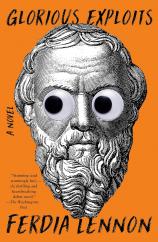Glorious Exploits
Review
Glorious Exploits
I confess that I was first drawn to Ferdia Lennon’s GLORIOUS EXPLOITS by its googly-eyed cover. Blending the serious with the silly, the ancient with the modern, I was intrigued by what I might find inside. That playful approach, with a serious undertone, does in fact mirror what readers will encounter in the pages of this debut novel.
Set in the aftermath of the Peloponnesian War on the island of Sicily, the book focuses on two unemployed potters in the city of Syracuse. Lampo, the narrator, is the comic relief of the duo; he’s irreverent, funny, crude and, for the most part, fearless. Although almost everyone on the island has lost someone or something during the war, Gelon, his friend, has a tragic backstory, having lost both his young son to illness and his wife to the war. He's convinced that his wife might still be alive, and he sees visions of her everywhere.
"Its contemporary voice and timeless messages will appeal to readers seeking a moving story about the power and limitations of art. Even those who aren’t customarily drawn to historical fiction will find much to applaud here."
Grieving and devastated, the only thing that salves Gelon’s spirit is his love of drama, specifically the plays of Euripides. When we meet Gelon and Lampo, they’re headed to Syracuse’s quarry, which has become a horrific makeshift prison for hundreds of Athenian prisoners of war. They come bearing food, but they have an ulterior motive --- they’re looking for people who might remember Euripides’ play “Medea” or, even better, have information on his rumored new play, “The Trojan Women.”
They do in fact encounter several men who know Euripides’ tragedies well, having performed them in their former lives. It soon becomes clear that Gelon doesn’t just want to learn a new play; he actually has ambitions to perform the tragedies, in the quarry, with a cast made up of Athenian prisoners. “Director, man…that’s what we are!” declares Lampo, and soon enough they are enmeshed in casting and rehearsals, not to mention finding costumes, sets, music and a producer to bankroll the whole undertaking.
The prospect of performing this play is a stark contrast to the mounting desperation of the Athenian prisoners’ lives (the prisoners are starving, and the quarry is overrun by rats and filled with dead bodies). As the performance approaches, the stakes get even higher. Meanwhile, Lampo is determined to woo and buy the freedom of an enslaved Lydian woman, Lyra, who has offered to teach him to read and write.
As the dialogue quoted above makes clear, Lennon cleverly makes use of modern speech in the way his characters speak to one another and in the tone of Lampo’s narration. This technique brings readers into the characters’ world, despite the more than two millennia separating them chronologically. The dialogue and narration, in particular, are often very funny, as are some of the situations, such as one scene where Lampo makes a series of very poor choices with the money their producer has invested in them. But these lighthearted moments can feel a bit like whistling in the dark as they play out against a backdrop of war and immense loss.
GLORIOUS EXPLOITS would be interesting to read alongside Isabella Hammad’s ENTER GHOST, which is about staging a production of “Hamlet” on the West Bank. Both novels provide powerful commentaries on the role of art and performance in wartime. Lennon’s book also offers a fascinating glimpse into an oral culture, one in which average citizens had entire plays and whole epic poems committed to memory, passed along through storytelling, performance and recitation. Its contemporary voice and timeless messages will appeal to readers seeking a moving story about the power and limitations of art. Even those who aren’t customarily drawn to historical fiction will find much to applaud here.
Reviewed by Norah Piehl on April 13, 2024
Glorious Exploits
- Publication Date: March 25, 2025
- Genres: Fiction, Historical Fiction
- Paperback: 304 pages
- Publisher: Holt Paperbacks
- ISBN-10: 1250893682
- ISBN-13: 9781250893680




